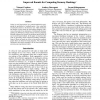Free Online Productivity Tools
i2Speak
i2Symbol
i2OCR
iTex2Img
iWeb2Print
iWeb2Shot
i2Type
iPdf2Split
iPdf2Merge
i2Bopomofo
i2Arabic
i2Style
i2Image
i2PDF
iLatex2Rtf
Sci2ools
AAAI
2006
2006
Improved Bounds for Computing Kemeny Rankings
Voting (or rank aggregation) is a general method for aggregating the preferences of multiple agents. One voting rule of particular interest is the Kemeny rule, which minimizes the number of cases where the final ranking disagrees with a vote on the order of two alternatives. Unfortunately, Kemeny rankings are NP-hard to compute. Recent work on computing Kemeny rankings has focused on producing good bounds to use in search-based methods. In this paper, we extend on this work by providing various improved bounding techniques. Some of these are based on cycles in the pairwise majority graph, others are based on linear programs. We completely characterize the relative strength of all of these bounds and provide some experimental results.
| Added | 30 Oct 2010 |
| Updated | 30 Oct 2010 |
| Type | Conference |
| Year | 2006 |
| Where | AAAI |
| Authors | Vincent Conitzer, Andrew J. Davenport, Jayant Kalagnanam |
Comments (0)

